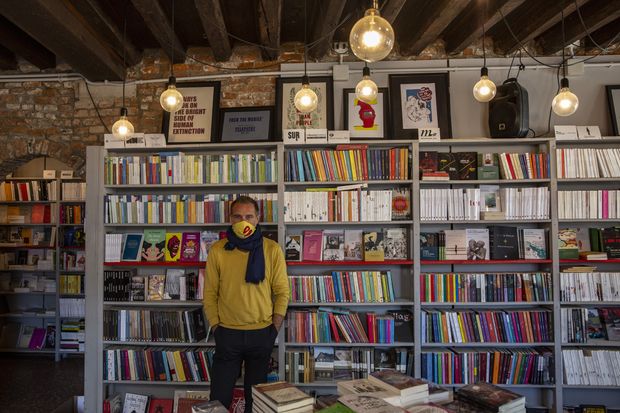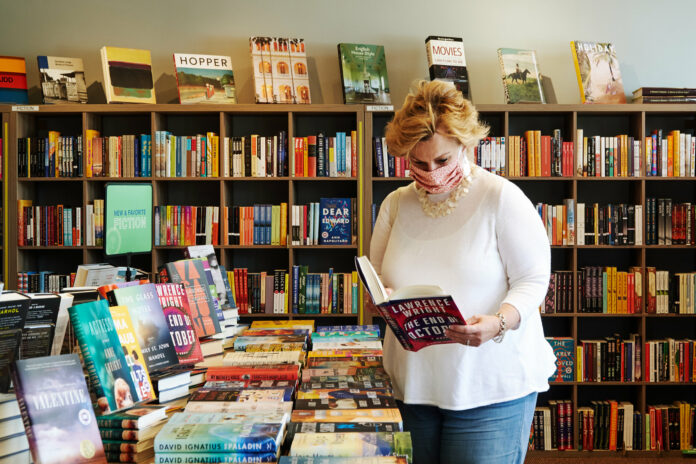By George Angelakis,
Taking a look back at December, it is improbable not to notice that bookstores and publishing houses proved to be resilient in 2020, despite the Covid-19 pandemic. The exceptional sales of winter saved the year, at the risk of masking the weaknesses of the sector.
The pandemic has barely scratched the surface of the book economy, which has not met the plight of other cultural sectors. Since January 2020, cinemas have lost 69% of their admissions, performing arts have witnessed the collapse of their turnover and museums have suffered terrible loses. In this field of ruins, only streaming platforms have generated a massive income as they have seen a great, highly anticipated rise in their subscribers. The truth is, that streaming platforms were expected to exhibit such an economic growth even without the pandemic, yet things assumed an exponential character as the repetitive lockdowns acted as a booster for them. And last but not least, against all odds, bookstores and publishing held up very well, minimising their loses or in some cases even making a profit.
From a social point of view, books are probably one of the cheapest means of entertainment and even after the arrival of the internet they still feel more trustworthy regarding the information they contain although that is not always the case. From a psychological point of view, in difficult times like these, books seem to represent the era of growth and stability and thus they function as an ideal sanctuary, a reminder of better days. Lastly, books have the unparalleled ability to employ less of your senses and more of your fantasy in entertaining you. No other cultural sector can manage to do that. That alone is enough proof that books have created such a strong foundation in our society and in our hearts that no crisis, no matter how big, can budge it.

A great index of societal reflexes and mood would be the major categories of books sold during the pandemic. Unfortunately, in Greece, statistics regarding the genres that sold the most during this time are really scarce. I reached out to some librarians and book store owners in order to gather some data. They pointed out that fiction novel sales were going fast as well as self-help book sales. Orwell’s “1984”, Camus’ “The Plague” and Mark Manson’s “The subtle art of not giving a f**k” were, according to them, their most demanded books. None of these choices are surprising though. “1984” talks about a dystopian society were free movement of people and ideas does not exist, “The Plague”, well, is pretty self-explanatory and Manson’s self-help book is so catchy that I would be surprised, if it did not sell well.
In some other countries, like France, official data do exist regarding the public’s preferences in books during this pandemic. Once again, “1984” sits comfortably on top while other novels by the same writer have got carried by the tide wave as well and can also be found up there. Camus is nowhere to be found, probably because the majority of French already got all his books. A book whose apparition in the list really surprised me was Maya Angelou’s “I Know Why the Caged Bird Sings”. Don’t get me wrong, it is a great book but it is also an old one, sold massively in a year unrelated to Angelou’s passing, hence why I am failing to see the connection here. It is most likely that it is a country specific trend of some sorts that I am missing.

By trying to find some more data in countries around the world, even though I could not find anything solid, I have noticed that in most cases, at least “1984” was mentioned as a best seller during the pandemic. Honestly, it is really great that people finally add this great book to their collection, yet, I am a bit worried about the number of people that did not own this must-have book already.
The bottom line is that the pandemic may have significantly affected people’s lives, closed down cinemas, theatres and concert halls but books stay strong, adapt to the circumstances and move on. George Orwell would be delighted to see that his masterpiece has reached so many people around the world, yet he would probably remain worried that when our little adventure is over, nothing will have changed in our fast approaching Orwellian reality.
References
- Nicole Vulser, Le Monde, “On n’a jamais autant parlé des librairies”: le livre ne connaît pas la crise, January 7th 2021. Available here.
- Jean Birnbaum and Zoé Courtois, Le Monde, “Le livre est un refuge”: en librairie, le sursaut des ventes et la solidarité des clients, August 6th 2020. Available here.
- Nicolas Truong, Le Monde, Comment George Orwell est devenu un penseur visionnaire et iconique du XXIe siècle, January 17th 2020. Available here.




